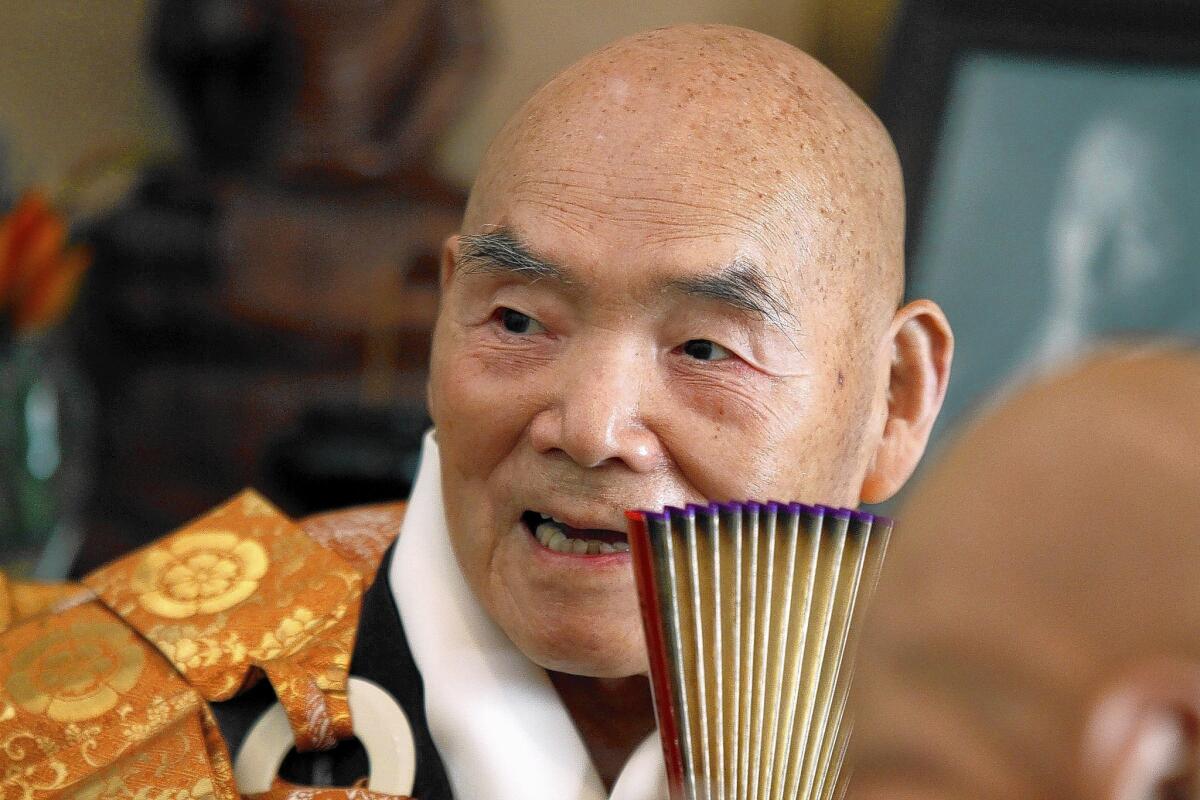Joshu Sasaki Roshi dies at 107; monk brought strict form of Zen Buddhism to U.S.

- Share via
When an obscure Japanese monk arrived in Los Angeles 52 years ago, he carried little more than a spare robe, a Japanese-English dictionary and an invitation to teach Zen.
But the trappings of his life would not always be so simple. At centers he established on Mt. Baldy and in Jemez Springs, N.M., Sasaki Roshi guided thousands of adherents through a particularly rigorous brand of Zen practice but also was accused of sexually abusing female students over a period of decades.
When the allegations surfaced on a Zen website in 2012, a council of senior Zen teachers ordained under Joshu Sasaki Roshi admitted that they had long known but done little.
“Our hearts were not firm enough, our minds were not clear enough, and our practices were not strong enough so that we might persist until the problem was resolved,” they said in an open letter of apology.
Joshu Sasaki Roshi died Sunday of age-related causes at Cedars-Sinai Medical Center in Los Angeles. He was 107.
His death was confirmed by Gento Steve Krieger, the head monk at Rinzai-ji, Sasaki Roshi’s headquarters in Los Angeles, who said the center was “still working through many issues and reaching out to the people who were harmed.”
“It tarnished his reputation,” Krieger said, “but people who are devoted to his teaching are not particularly worried about reputation.”
Although a monk, Sasaki Roshi was not expected to be celibate. He is survived by his wife, Haruyo Sasaki.
As long ago as the early 1960s, Sasaki Roshi allegedly urged women to show him their breasts in private meetings that were supposed to enhance their understanding of Zen. Using his position as teacher, he persuaded or intimidated some of his students into performing sexual acts, according to a letter first published on the website sweepingzen.
No criminal charges were filed, Krieger said.
Despite the decades of rumors about Sasaki Roshi, he was widely seen as charismatic.
Songwriter Leonard Cohen, who lived and studied at the Mt. Baldy center for five years starting in 1994, called his relationship with Sasaki Roshi “a liberating kind of love.”
“You know, he’s both the friend and the enemy,” Cohen said in a 1996 documentary. “He’s going to be an enemy to your self-indulgence, an enemy to your laziness, and a friend to your effort. He’s going to be cutting, he’s going to be charming, he’s going to be lovable, he’s going to be deceptive. He’s going to be all the things that he has to be to turn you away from depending on him.”
Born to farming parents in Japan’s Miyagi prefecture on April 1, 1907, he started his religious studies at a temple in Sapporo when he was 14.
On his arrival, he was asked: “How old is the Buddha?”
His response was suitably Zen: “The same age as me.”
Sasaki Roshi trained for years in a distinctively strict style of Zen that he transplanted to the U.S. His students rose at 3 a.m. for chanting, exhausting hours of meditation and one-on-one meetings with their teacher, who would pose impenetrable koans, riddles like: ‘When you see the flower, where is God?’
Over the years, Sasaki Roshi taught internationally and developed a network of about 30 affiliated Zen centers throughout the U.S.
At 101, he was still vital, said Robert Buswell, a UCLA professor of Buddhist studies.
Over dinner at his home, “he was still bright and extremely clever,” Buswell said, “and while having profound conversations about Zen, he was able to catch flies out of the air with his hands.”
A few years later, Sasaki Roshi was asked his secret for longevity, recounted Shozan Jack Haubner in a 2013 book, “Zen Confidential: Confessions of a Wayward Monk.”
“White rice, white flour and white sugar,” the teacher proclaimed. “And sake!”
Times staff writer Christine Mai-Duc contributed to this report.
Twitter: @schawkins
More to Read
Start your day right
Sign up for Essential California for the L.A. Times biggest news, features and recommendations in your inbox six days a week.
You may occasionally receive promotional content from the Los Angeles Times.







